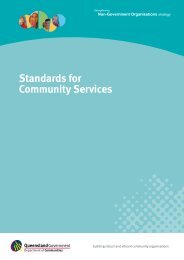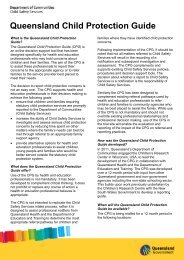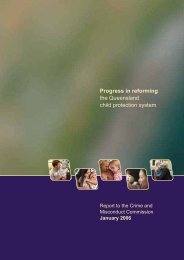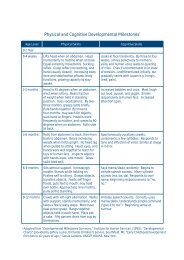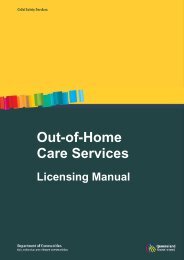Housing and Support Program (HASP): Final Evaluation Report
Housing and Support Program (HASP): Final Evaluation Report
Housing and Support Program (HASP): Final Evaluation Report
Create successful ePaper yourself
Turn your PDF publications into a flip-book with our unique Google optimized e-Paper software.
68<br />
Section 8 Discussion<br />
8.3 The opportunities available through the program for clients to maximise their<br />
recovery <strong>and</strong> participate in community life — the focus here will be on social,<br />
recreational, educational <strong>and</strong> vocational activities in the community<br />
During interviews with clients we heard several<br />
accounts of how <strong>HASP</strong> had helped them to move from<br />
a life fi lled with despair <strong>and</strong> isolation to one of hope.<br />
All of the clients interviewed felt that the housing <strong>and</strong><br />
support provided through <strong>HASP</strong> were essential in<br />
promoting recovery. While eight of the 80 <strong>HASP</strong> clients<br />
(10%) were in paid employment, the hours worked<br />
ranged from four to 60 per week, with a mean of<br />
18.06 hours worked per week. However, it should<br />
be noted that over 40% of clients indicated that they<br />
would like to have paid employment as their main<br />
activity. Thus, there is some scope to engage with<br />
these clients <strong>and</strong> link them into training or other<br />
activities, such as volunteer work, to improve their<br />
chances of securing paid employment in the future.<br />
While 39% of the sample outlined that they would<br />
be able to fi nd someone to ‘put them up’ if they<br />
needed somewhere to stay for a few days, 44% felt<br />
that they would have trouble fi nding someone to drive<br />
them to hospital if they were ill. Indeed, over one-fi fth<br />
of clients indicated that they did not have ‘one person<br />
they could trust’. It is clear that many of the clients who<br />
claimed to have friends, included family members as<br />
friends. Indeed, over one-third of the clients outlined<br />
that they felt lonely <strong>and</strong> bored in the month prior to<br />
data collection.<br />
Access to suffi cient money <strong>and</strong> control over money<br />
are important factors in being able to maintain life<br />
in the community. Overall, <strong>HASP</strong> clients were satisfi ed<br />
with the amount of money they had to spend. Moreover,<br />
they expressed high levels of satisfaction with the<br />
amount of control they had over their money. This was<br />
somewhat surprising given that 51 of the 80 clients<br />
in the study (63%) had their fi nances managed by the<br />
Public Trustee. However, having their fi nances managed<br />
by the Public Trustee enabled some clients to purchase<br />
goods <strong>and</strong> services that they could never previously<br />
afford. By way of example, one client was able to save<br />
enough money to have a holiday in Cairns, while another<br />
described how he was able to buy a racing bicycle<br />
(something he had wanted to do for a number of years,<br />
but never had enough money to do so).<br />
<strong>Final</strong> <strong>Evaluation</strong> <strong>Report</strong><br />
Nonetheless, clients should be encouraged (where<br />
possible) to manage their own fi nances. This may<br />
require further education <strong>and</strong> close monitoring of<br />
spending behaviour until clients gain skills in money<br />
management.<br />
It is clear from the interviews with clients that access<br />
to transport is an import factor in their lives. While<br />
public transport is frequently available, many clients<br />
feel anxious or uncomfortable about using public<br />
transport. In recognition of this, some support<br />
agencies provide private transport for their <strong>HASP</strong><br />
clients. Indeed, 66% of the clients indicated that their<br />
support agency/support workers provided transport.<br />
However, the payment of support agencies/workers<br />
for this service does raise some concerns. In some<br />
situations, it was noted that the client pays the support<br />
worker directly for the transport provided. In others,<br />
support workers transport clients free of charge <strong>and</strong><br />
claim the cost in their annual tax return as a workrelated<br />
deduction. <strong>Final</strong>ly, some agencies take funding<br />
from the client’s <strong>HASP</strong> package to fund transport<br />
costs. It is clear that there needs to be some clarity<br />
provided around the provision of transport <strong>and</strong> how<br />
the costs for transport are to be reimbursed by clients.



